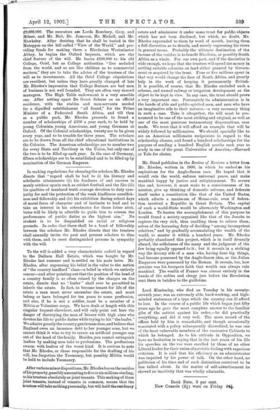After various minor dispositions, Mr. Rhodes leaves the residue of
his property, possibly amounting to five or six millions sterling, to his trustees absolutely as joint tenants. This making of them joint tenants, instead of tenants in common, means that the trustees will take nothing personally, but will hold theresiduary
estate and gdmihister it under Some trust fot public, objects which has not been disclosed, but which, no doubt, Mr. Rhodes expounded to them by word of mouth, leaving them a full discretion as to details, and merely expressing his views in general terms. Probably the ultimate destination of the income of the residue is to benefit Rhodesia, or possibly South .Africa as a whole. For our own part, and if the discretion is wide enough, we hope that the trustees will spend the money in settling suitable colonists on land either granted by Govern- ment or acquired by the trust. Four or five millions spent in that way would change the face of South Africa, and greatly help in the work of keeping it permanently British. It is possible, of course, that Mr. Rhodes excluded such a scheme, and named railway or irrigation development as the object to be kept in view. In any case, the trust should proie a very important one. Fortunately its administration is in the hands of able and public-spirited men, and men who have an imaginative side to their natures,—a very necessary thing in such a case. Take it altogether, the will must be pro- nounced to be one of the most striking and original, as well as one of the most generous testamentary dispensations, ever made. We trust that it will afford an example that will' be widely followed by millionaires. We should specially like to see an American millionaire reciprocate in regard to the scholarship clauses, and found a hundred scholarships for the purpose of sending a hundred English youths each year to study in one of the great Universities of America,—Harvard or Yale for choice.










































 Previous page
Previous page